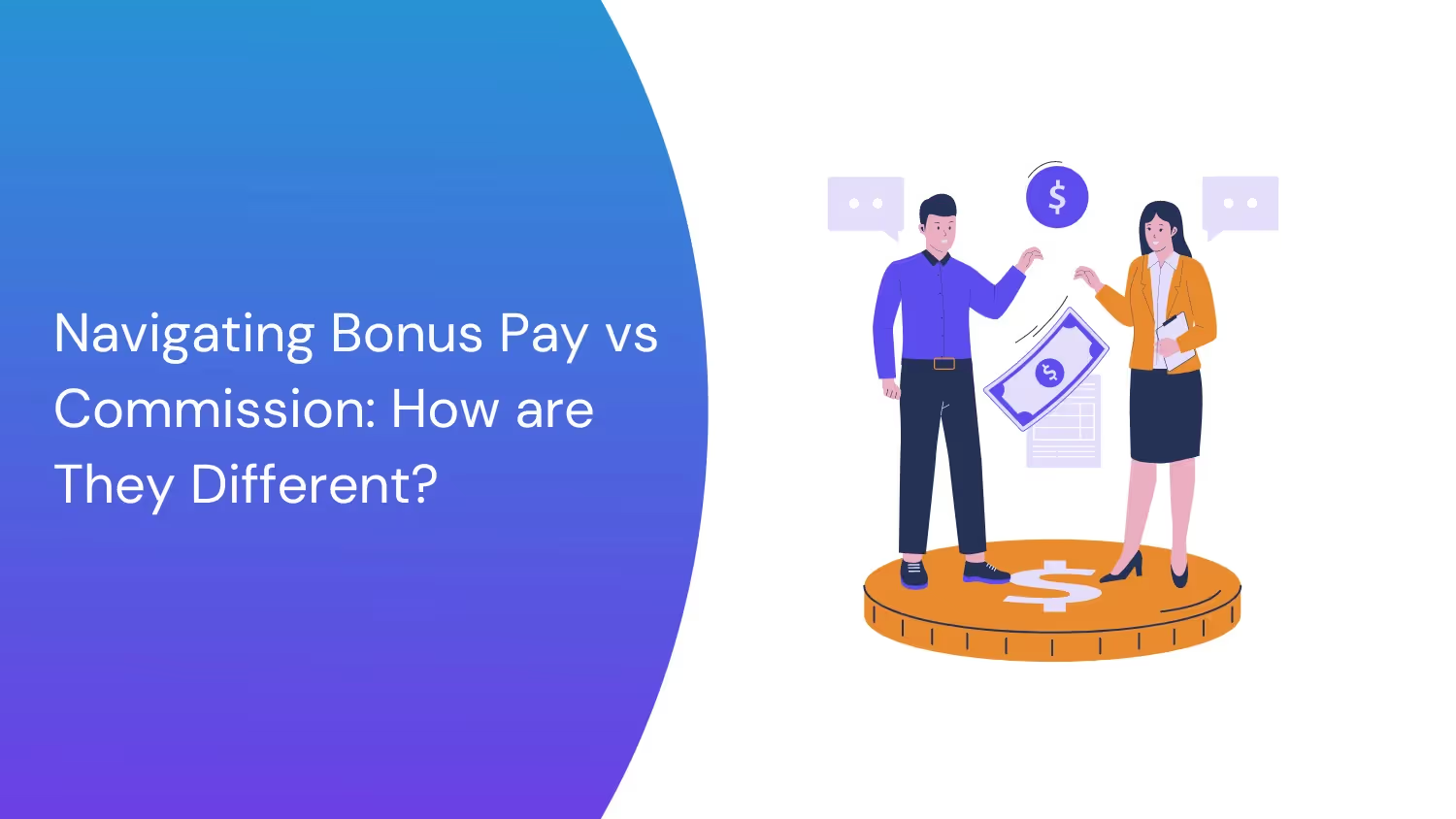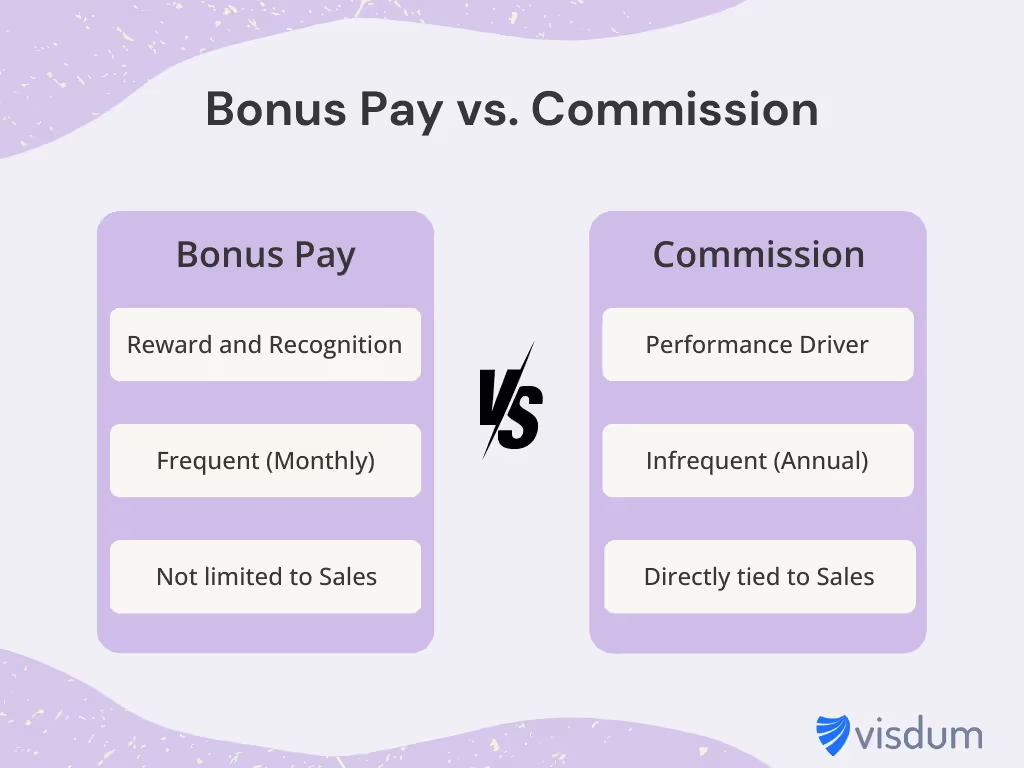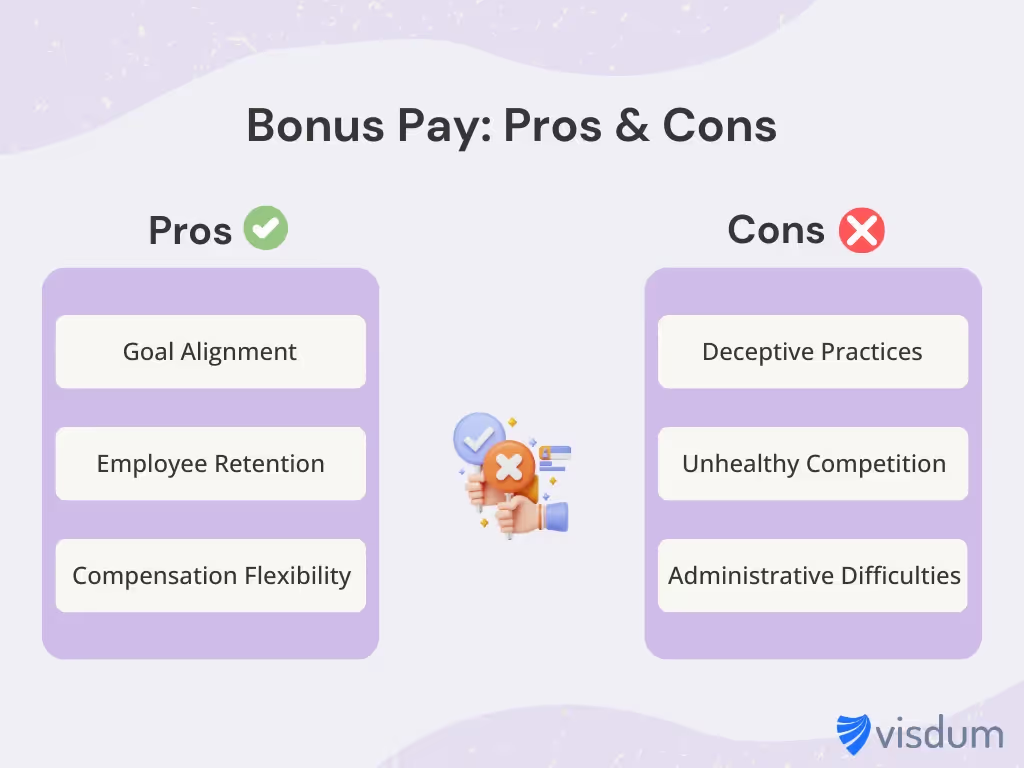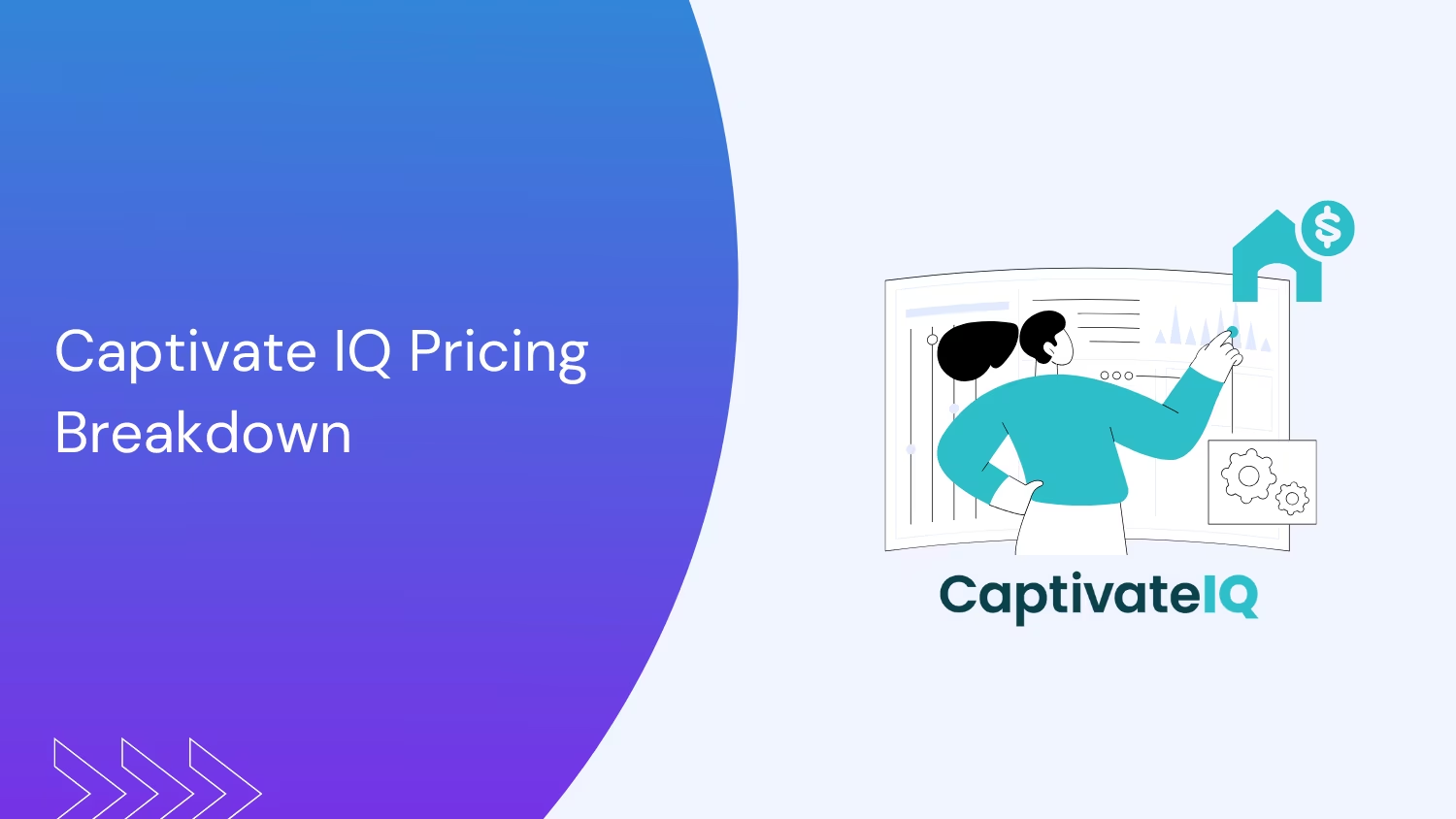Navigating Bonus Pay vs Commission: How Are They Different?

Whether it’s a bonus pay or commission, both incentive types are crucial in ensuring fair compensation and motivating your Salesforce.
The Society for Human Resource Management study reveals compensation's pivotal role in job satisfaction. An overwhelming 96% of workers rate their pay as crucial to their on-the-job happiness.
With that whopping percentage standing tall, which incentive strategy should you follow at your workplace to drive greater employee satisfaction and productivity — bonus pay or commission?
This comprehensive guide explores bonus pay and commissions, comparing their key features and pros and cons. The article will also help you determine and choose the better pay structure based on your company needs.
An Overview of Bonus Pay and Commissions
Bonus pay and commissions are both forms of additional compensation. While the bonus is a company-wide phenomenon with little fixed structure, commissions are something specific to the sales department.
What is Bonus Pay?
A bonus is an additional lump sum payment given to an employee beyond their normal salary or wages. It is an infrequent part of compensation (not included with every salary or payment) and can come in many forms such as:
- Performance Bonus: This is a type of bonus given to employees for meeting or crossing performance expectations. For example, a company decides to award $2,000 to one of their salespersons for crossing 120% of their sales quota.
- Annual Bonus: It is the bonus given to employees at the end of the year depending on how the company performed during the year, taking into account individual performance records as well.
- Retention Bonus: It is a bonus offered to a valuable employee to incentivize him/her to stay in the company when they have other offers or the threat of leaving is prominent.
Seeing the various bonuses given above, one thing is made clear. The employees do not always know whether a bonus is coming their way. This brings us to discretionary and non-discretionary bonuses.
Discretionary and Non-Discretionary Bonuses
Discretionary bonuses are bonuses that the employer gives at their own volition. They are not guaranteed and are not a part of the compensation package of the employee. As such, there are no fixed criteria for determining the amount of discretionary bonuses or their timeline.
What a discretionary bonus may look like:
Company A has performed well in the last quarter because John, a salesperson, closed 3 massive deals. The company gives John a bonus of $5,000 on top of his compensation package (which includes commissions).
On the other hand, non-discretionary bonuses are bonuses that are disclosed beforehand and are dependent on fixed pre-determined performance criteria. They may be tied to project completion deadlines, performance criteria, etc. They are predictable and transparent.
What a non-discretionary bonus may look like:
Company B has an annual bonus of 10% (of the salary) for its employees according to their performance and the company’s profitability.
What is Commission Pay?
Commissions are incentive payments that are directly tied to sales. If a salesperson has a commission rate of 10%, then they receive 10% of the revenue they generate through sales. Commission pay is usually frequent, usually paid along with salary. A commission is a cut given to the salesperson from the sales revenue to incentivize them to sell more. However, commission structures can also be modified to increase their incentivizing power.
Accelerators and Decelerators
Salespersons usually have a fixed commission percentage that is already disclosed to them in their compensation structure. However, some companies also use accelerators and decelerators.
Accelerators can be classified as an increase in commission rates after the attainment of the sales quota. For example, Gary, a salesman for Company X has 10% as his commission rate up to $30,000 in sales revenue (his sales quota). However, beyond that, his commission rate increases to 15% for the revenue above $30,000. It is a monetary appreciation and incentive for crossing targets.
Similarly, decelerators result in decrease in commission rates when a salesperson fails to meet their targets. For example, the same company reduces the commission rate to 8% below 80% completion of the sales quota. This is done to push the reps to meet their quota.
Bonus Pay vs Commission: What is the difference?

Now that we know what bonus pay and commission pay means, let’s look at the key differences between them:
1. Purpose
Bonuses serve the purpose of reward and recognition. They are the employer’s token of appreciation for knowing that their team went above and beyond to meet and exceed the goals they had set for themselves. Bonuses encourage overall and team performance, and usually include company performance as a factor as well.
On the other hand, commissions are directly tied to sales. They aim to incentivize sales and increase sales revenue directly. This is why commissions are calculated as a percentage of the sales revenue generated by a salesperson.
2. Payout Frequency
Bonuses are infrequent forms of compensation, usually paid out annually or semi-annually. They have no fixed timeline (such as discretionary bonuses) and can be skipped out altogether if the company does not meet performance targets.
Commissions, however, are frequently paid out and are fixed by nature, included in the monthly payments of the sales reps. If the company uses a combination of base salary and commissions, they are usually paid out together monthly.
3. Determining Factors
Bonuses may be fixed in advance according to certain performance criteria or other guidelines set and communicated by the company, or they may be discretionary, arising purely from a view of appreciating great performance and reaching milestones.
Commissions, again, are directly tied to sales. Companies base sales commissions on several factors such as sales revenue, and sales targets, and may even use dynamic commissions that increase if the targets are exceeded (commission accelerators). Individual commission structures are fixed and communicated in the employment terms of the salespersons and the sales team at large.
4. Calculation & Computation
Bonuses are usually calculated as flat amounts or a percentage of the base salary. For example, if a salesperson has performed exceptionally and the company has benefited from them substantially, they may be given a $2000 bonus or a 10% bonus. A 10% bonus would be calculated on base salary, so if the annual base pay is $60,000, the bonus would be $6,000.
Commissions, however, are a direct product of sales. If a salesperson has a fixed commission of 10%, then generating $50,000 in sales revenue would result in them getting $5,000 in commissions. Tiered commissions operate similarly, where exceeding the target raises the commission percentage, and not reaching the target reduces it.
A Case Study to Understand Bonus Pay
Company: ABC Software Ltd.
Bonus Criteria: Employees of the company are entitled to a bonus according to their annual performance ratings in the following manner:
- Outstanding: 15% of base salary
- Exceeds Expectations: 10% of base salary
- Meets Expectations: 5% of base salary
- Below Expectations: No bonus
The bonus amount will be paid in the first month of the following year.
Employee: John Davis
Role: Software Developer (SDE- I)
Base Compensation: $70,000
John Davis ended 2023 with a performance rating of ‘Exceeds Expectations’. He was responsible for carrying out crucial improvements to two of the software offerings from ABC Software and also provided comprehensive debugging support to the rest of the team.
Bonus Calculation: According to the performance rating, John is entitled to a bonus of 10% on top of his base salary.
John’s Bonus= 0.10*70000 = $7,000
John will receive this $7,000 in the monthly payment for the first month of the next year.
A Case Study to Understand Commissions
Company: ABC Software Ltd.
Employee: Lauren Smith
Role: Account Executive
Lauren’s Compensation Terms
Base Salary: $70,000 annually, or $5833 monthly
Sales Quota: $50,000 per month
Commission Rate: ABC Software uses a tiered commission structure for their employees, the terms of which for Lauren are:
- A base commission rate of 10%
- The commission rate increases to 12% for sales revenue beyond $50,000
- The commission rate decreases to 8% if sales revenue achieved in a month is less than $35,000.
In June 2024, Lauren had an excellent month in terms of deals and closed $70,000 in sales revenue.
Lauren’s commissions for June 2024 = 0.10* 50000 (base commission) + 0.12* 20000 (increased commission)
= 5000 + 2400= $7400
Lauren’s total compensation for June 2024 = $5833.3 (base pay) + $7400 (commissions) = $13233.3
Pros and Cons of Bonus Pay

Bonuses are, in many ways, double-edged swords. While there are many performance benefits of providing bonuses and they make your employees feel more included and attached to the company’s vision, they may also stir up some negative emotions and administrative issues.
Pros
- Goal Alignment: Bonuses are monetary incentives that align employees with the company’s objectives and increase their stakes in the company’s success. They keep employees focused and motivated to perform better.
- Employee Retention: Bonuses increase job satisfaction for employees by making them feel adequately recognized. They also help the company attract top talent due to increased job satisfaction, helping in better hiring and retention.
- Compensation Flexibility: Bonuses serve as flexible compensation tools that the company can adjust according to its performance. Non-discretionary bonuses allow companies to recognize outstanding performance, without undertaking a recurring financial liability.
Cons
- Potential for Unfair Practices: To improve their performance metrics, employees may engage in unfair and deceptive practices to push up the numbers and window-dress their reports to get a bonus.
- Unhealthy Competition: If an employee gets a bonus, and others don’t, then a feeling of hostility may be created, which undermines team performance and collaboration.
- Administration Difficulties: Dejected employees may feel that bonuses are based on favoritism and subjectivity, and it becomes very difficult to keep bonuses transparent. Similarly, adjusting the payroll and documents for different bonus amounts at different times is a huge task for HR.
Pros and Cons of Commission Pay

Just like bonuses, commissions are not without their flaws. However, they are still extensively used as the pros outweigh the cons.
Pros
- Performance Boost: As commissions are directly tied to sales performance, they incentivize salespersons to sell more. Modern sales commission automation software enables sales reps to see their commission earnings going up in real-time, directly proportional to their company’s revenue, which motivates them to perform better.
- Efficient Cost Control: As a form of variable incentive, commissions serve as an excellent cost control mechanism. Commission payment liabilities only arise for the company if the sales revenue is going up, which ensures that in case of revenue and performance slumps, spending on compensation is reduced.
- Alignment with Business Goals: Commissions can incentivize employees to the company’s objectives. Increased commissions on certain products can increase the salespersons’ focus on those products. Similarly, increased commissions on newer markets can lead to higher market penetration. Sales commissions are effective tools for making the sales team respond to company objectives.
Cons
- Encouragement of Aggressive Tactics: An increased focus on selling more to earn more may encourage the use of shady tactics and shortcuts to close deals, such as deceiving leads to selling under false terms. This can lead to a poor-quality customer base and high churn rates for SaaS businesses.
- Income Variability: A large variable component in an employee’s compensation may cause them to take unnecessary pressure or become demotivated. Employees should ensure that salespersons are adequately compensated even with a fixed part of their compensation.
- Administrative Difficulties: Designing commission plans and implementing them is no easy task. On top of that, keeping track of commission earnings and performance reports requires a lot of time and effort if done manually.
Curious about sales commissions? Read more about their effective usage and complexities in our comprehensive guide to sales commissions in 2024.
How to Choose Between Bonus Pay and Commissions

Selecting the right incentive structure can make or break your sales team's performance. While both incentive strategies have their own merits and demerits, there are a few factors that you should keep in consideration while selecting the one you want to opt for.
Your choice should depend upon factors such as:
- Company Objectives: The choice between bonus pay and commissions depends heavily on company objectives. Pushing sales and driving revenue can be achieved through proper usage of commissions, while a positive culture and employee satisfaction can be developed through bonus pay.
- Nature of the Role: Bonuses are better for roles where objectives are not revenue-centric, such as project completion, new launches, customer support, etc. whereas commissions are better suited to sales and revenue-centric roles.
- Complexity: Asses the level of complexity your organization can responsibly handle. Manual commissions are prone to errors and require a lot of time and effort. Whereas bonus pay can be relatively easy to navigate. Consider using a sales commissions automation platform to make commissions easier.
- Employee Motivation: While some employees might prefer commission-based variable pay, others might prefer bonus pay. Think about whether you want to promote individual performance or team collaboration.
- When to Use Bonus Pay
Bonus pay is a better choice for roles that aren’t directly tied to revenue revenue such as admin roles, management, client success, etc. For rewarding and recognizing overall performance, team performance, and promoting teamwork, bonuses are more effective. Similarly, the administration complexities of bonus pay are also quite manageable.
- When to Use Commissions
If your company’s aim for the foreseeable future is to increase revenue and drive sales, then commissions are a better choice for sales-centric roles. They promote motivation in salespersons looking for a high earning potential. Also, if you are equipped to handle sales commissions adequately, such as by using sales commissions software, they can lead to a better ROI than any other form of variable compensation.
Wrapping Up
Whether you choose bonus pay, commission pay, or a combination of both of these forms of variable compensation, the pressing need is to figure out the optimum usage of such compensation techniques. Poorly structured commissions lose their incentivizing power, while unearned bonuses lead to a lack of motivation to perform.
Sales performance is driven by sales behavior. Sales behavior is driven by a combination of culture and incentives. Encouraging positive behavior with smaller and occasional non-monetary appreciation can lead to higher gains than better commissions and fatter bonuses.
FAQs
Can bonus be a part of CTC?
Yes, a bonus is usually part of the CTC (cost-to-company) since it is a form of remuneration to the employee.
How do you calculate bonuses and commissions?
Bonus is usually calculated as either a fixed percentage of the base salary or a fixed amount that is already defined. On the other hand, a commission is calculated as a percentage of the sales revenue generated.
Is a bonus considered a salary?
No, even though bonuses are taxed as salary and are part of the overall compensation package, they are not the same as salary. A salary is a fixed payment with a fixed timeline as defined in the employment terms of an employee, whereas a bonus is usually contingent on individual or company performance, and is paid on top of the salary.
Is a bonus fully taxable?
The IRS considers bonuses as a form of supplemental wages, and as such, they're subject to federal taxes, just like your normal pay.
Are commission and bonus the same?
No, a commission is a percentage cut of the sales revenue given to the salesperson who made those sales, whereas a bonus is an additional payment made to an employee for achieving performance goals or other milestones.


.webp)
.webp)

